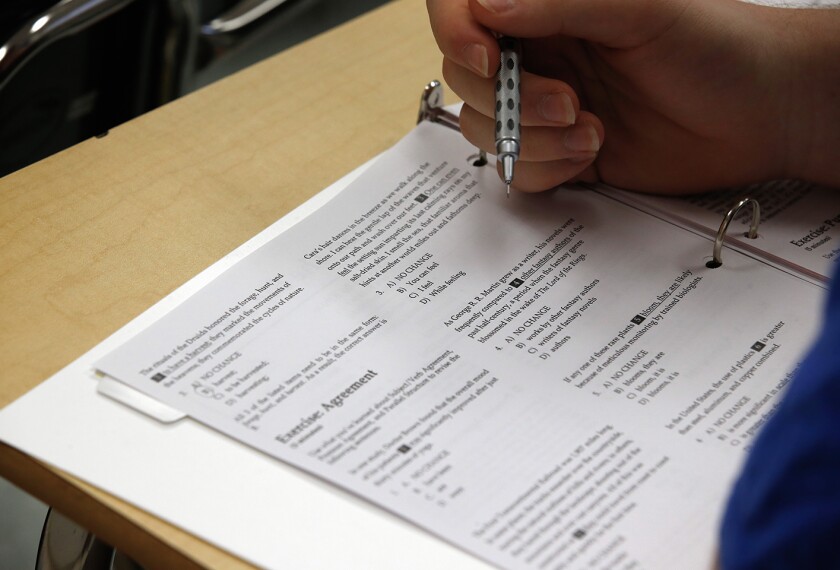A new study calls into question the popular notion that grading standards in the nation’s high schools just aren’t what they used to be.
Read the report, “Changes in High School Grading Standards in Mathematics, 1982-1992,” from RAND Education. (Requires Adobe’s Acrobat Reader.)
Researchers Daniel M. Koretz and Mark Berends drew from two nationally representative surveys of students to see whether increases in mathematics grades between 1982 and 1992 bore any relationship to changes in standardized- test scores over the same period. They found no evidence of any widespread grade inflation—at least during those years and in that subject. If anything, they found that for most students, math grades declined once test scores were factored in.
“The picture isn’t necessarily what people have heard it is, or what they immediately see in their own communities,” said Mr. Koretz, a professor of education at Harvard University’s graduate school of education. He was a senior social scientist for the RAND Corp., a think tank with offices in Santa Monica, Calif., and Arlington, Va., when he conducted the study with Mr. Berends of RAND.
The College Board, based in New York City, hired the think tank to flesh out a national picture of the trends that higher education institutions sensed among students applying for college admissions.
“We have seen scores on the SAT increase slightly or remain stable, yet there are much higher proportions of students today who are going to college or planning to go to college and have A averages,” said Wayne J. Camara, the vice president for research and development at the College Board, which has its own study on grade inflation due out later this year.
Reports of grade inflation have likewise been widespread in the news media. Articles point, for example, to high schools where as many as 16 seniors tie for valedictory honors, or elite colleges where few students earn anything lower than a C. One fear is that letter grades will become meaningless to admissions officers trying to sort out which applicants are ready for college study and which are not.
Few studies, however, have explored those claims in any depth.
|
“I think a lot of the rhetoric is perhaps based on very selective readings and putting a very selective lens on grade inflation,” said Mr. Berends, a senior social scientist in RAND’s Virginia office. “And it’s a very tricky issue to study.”
In contrast, the RAND study suggests that reports of grade inflation might only be true for certain populations or time periods. For their investigation, the researchers examined the transcripts and test scores of nearly 24,000 students who took part in two federally funded research projects: the High School and Beyond study and the National Education Longitudinal Study of 1988. The former yielded data on students enrolled in 12th grade in 1982; the latter focused on their 1992 counterparts.
While math grades did, in fact, creep up over those years, the researchers found, test scores rose even more. When the score increases were taken into account, the researchers found that students’ math grades actually declined from 1982 to 1992.
One exception to that trend came among the highest scoring 16 to 20 percent of students. In that category, the researchers saw no evidence of falling grades.
Over the same period, students also began taking more math courses and more of the courses that were traditionally considered college-preparatory. When the researchers adjusted their numbers to account for those increases as well as the rise in test scores, they again found a decline in most students’ grades.
Limits Acknowledged
But the researchers were also quick to point out their study’s limitations. They were unable to verify whether Algebra 1 in 1982 covered the same content as an Algebra 1 course a decade later, for example, or whether school-to-school variation in grading standards might mask inflationary grading trends in some schools.
In addition, while the tests used were statistically linked so that the researchers could compare student proficiency on the same kinds of test questions, the tests were not equivalent.
The College Board’s forthcoming study tracks grading patterns for college-going students from 1976 to 1999. Mr. Camara said it will show that grade increases kept pace with SAT scores until 1988, when grades outpaced scores on the admissions test and began climbing. Researchers say more studies are needed, though, to get a clearer picture of where those apparent changes in grading patterns occurred and what they might mean.





